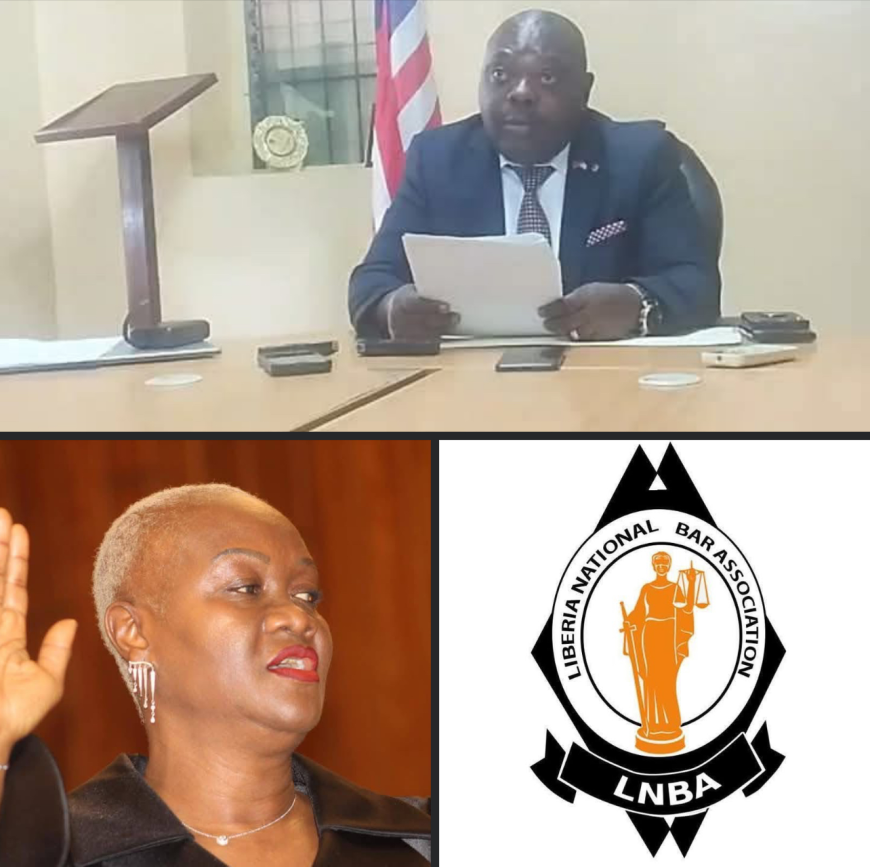Liberian National Bar Association Challenges Supreme Court’s Ruling on Bill of Information in Legislative Dispute

Monrovia, Liberia: The Liberian National Bar Association (LNBA) has openly challenged the Supreme Court of Liberia’s handling of a politically charged dispute within the House of Representatives, warning that the Court’s April 23 ruling on an Amended Bill of Information filed by House Speaker J. Fonati Koffa undermines the separation of powers and invites judicial overreach into political territory.
At the center of the controversy is the Court’s decision to entertain and rule substantively on a Bill of Information an instrument traditionally reserved for clarifying or enforcing existing judgments effectively issuing what the Bar describes as a second opinion in an already adjudicated constitutional matter.
LNBA: Supreme Court is ‘Stretching Its Powers’
While reaffirming respect for the judiciary’s constitutional role, the LNBA did not mince words. In its statement, the Bar accused the Supreme Court of stepping outside its mandate by allowing its courtroom to become a forum for resolving political power struggles within the Legislature.
“The Court has expanded the function of the Bill of Information far beyond its legal limits, issuing a second and substantively different opinion on the same constitutional issue,” the LNBA wrote. “This amounts to a dangerous inflation of judicial power and an erosion of institutional boundaries.”
The Bar also warned that this development could set a precedent where political actors sidestep their responsibilities and exploit the judiciary to settle internal disputes they should resolve themselves.
A Politically Charged Use of the Bench
Speaker Koffa’s use of the Bill of Information has raised eyebrows in legal and political circles, with critics suggesting that the judiciary is being drawn into a tug-of-war over legislative leadership and control. The LNBA stopped short of accusing the Court of partisanship but stressed that its ruling could be perceived as judicial interference in legislative affairs.
“The ongoing conflict in the House is political at its core,” the Bar stated. “The Court should interpret the law not serve as a tool for enforcing internal legislative control.”
A Mandate That Never Existed?
The Bar’s argument hinges on a key procedural issue: whether the Supreme Court’s original December 6, 2024 ruling contained a specific mandate that could legally justify a Bill of Information. According to the LNBA, it did not.
“The Court’s December opinion gave no enforceable directive. Therefore, the Bill of Information had no legal ground. What followed was not clarification—it was re-litigation under the guise of procedural propriety,” the statement said.
A Warning Shot to the Judiciary
Legal analysts see the LNBA’s statement as one of the strongest institutional criticisms of the Supreme Court in recent years—an implicit warning that the judiciary risks losing its credibility if it becomes entangled in political maneuvering.
“This is more than a legal disagreement,” said one senior legal practitioner who requested anonymity. “This is the Bar drawing a red line on how far the Court can go in politically sensitive matters.”
What Next?
As Liberia navigates a fragile post-election political climate, this clash between the Bar and the Bench highlights broader concerns over democratic backsliding, institutional manipulation, and the blurring of lines between branches of government.
With political tensions simmering in the Legislature, and the judiciary now at the center of controversy, the nation’s legal community appears to be calling for a return to constitutional restraint and a clearer demarcation of powers.
What's Your Reaction?









































































